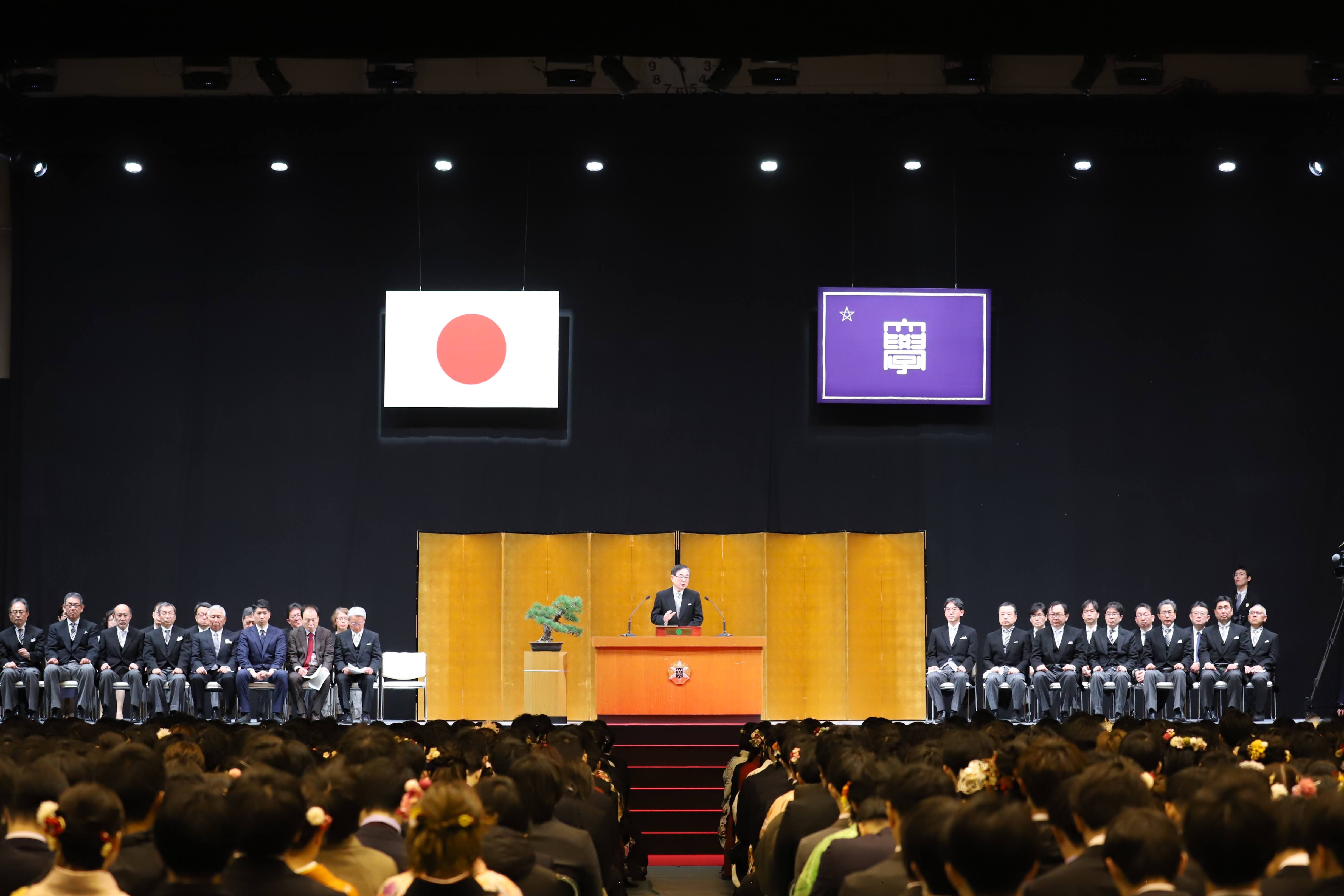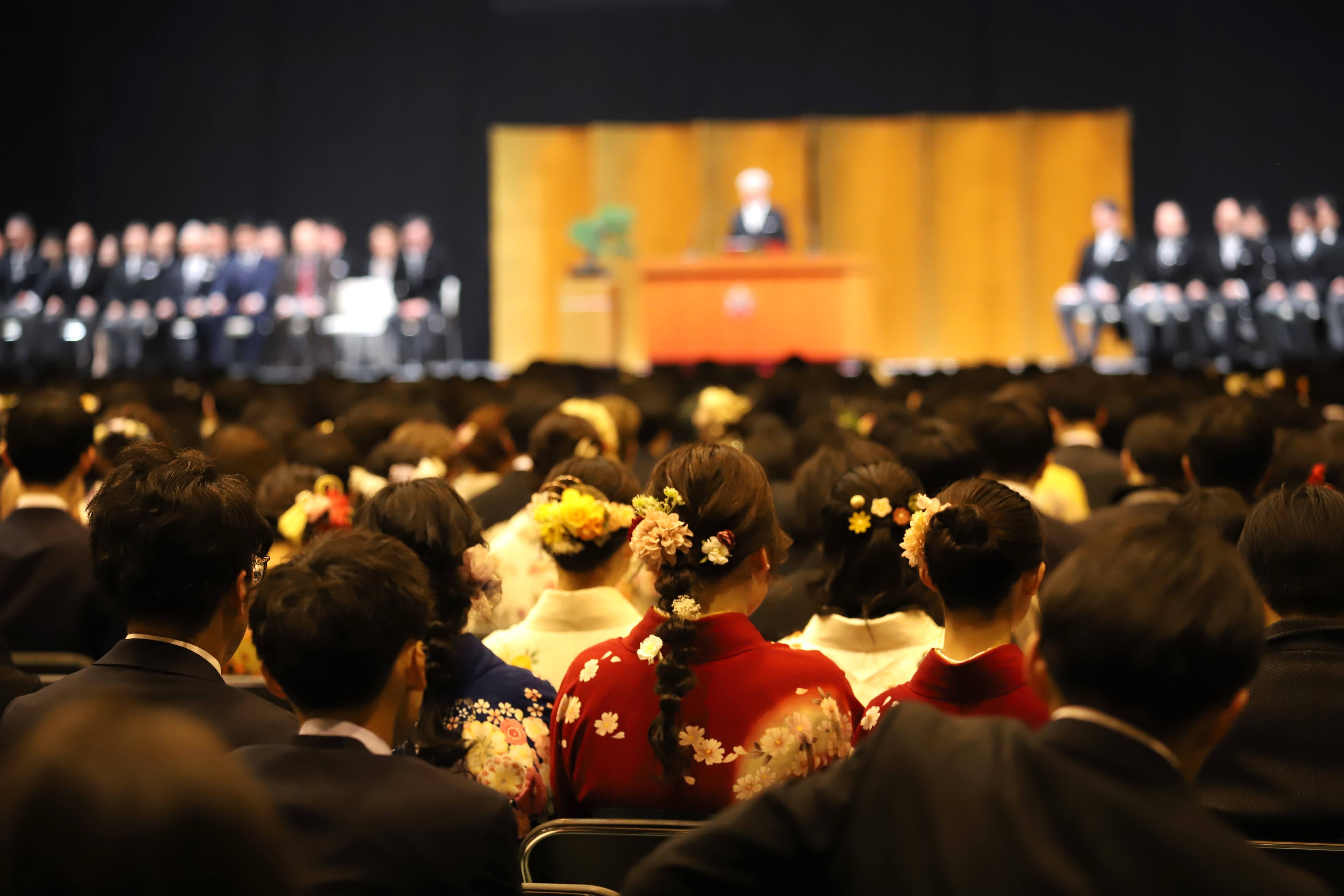Graduate Degree Commencement Ceremony - Farewell Address (March 2024)
(令和5年度修士、専門職学位、博士学位記授与式 告辞)

On behalf of Hokkaido University, I would sincerely like to congratulate all of you, a total of 2,020 students, upon completing your graduate studies today. In particular, I would like to express my deepest respect and greater congratulations to the 337 international students who have completed their studies at our university, exerting tireless efforts in an unfamiliar foreign environment.
I would also like to extend my congratulations and gratitude to your families, guardians, mentors, and all the other people who have supported you and encouraged you to this day.
I wish to take this opportunity to reflect on the time you spent on your studies here. The period of your research life coincided with the three-and-a-half years in which your daily life was significantly restricted due to the COVID-19 pandemic.
All of you, as well as students who started their graduate studies in the adjacent years, were most affected by this pandemic. In fact, most face-to-face events, such as the entrance ceremony and degree commencement ceremony, were canceled. The most important element of higher education, communication among students and between students and faculty members was severely hampered. In the graduate schools, there was a significant impact on the research activities where close communication is fundamental. In this sense, it is an immense pleasure to be able to celebrate your new beginnings without restrictions, with all the graduates, their families, the people involved, including our faculty and staff.
During this period, the global landscape around us has changed dramatically. I will not address each event, but some of them will have a significant impact on your lives in the future. First, in the past few years, the threats to global environmental sustainability due to climate change have become even more visible. Second, the situation in Ukraine reminds us that world peace and order are extremely fragile. The world also recoiled at the possibility of nuclear war. The time on the so-called Doomsday Clock, which metaphorically indicates how close we are to the end of the world, shows only 90 seconds to midnight, the shortest ever to global catastrophe.
Furthermore, we have witnessed in Palestine and Gaza the reality that the humanitarianism that our predecessors built on the lessons of history can crumble so easily.
Looking at the developments in science and technology, we see the emergence of generative AI and the arrival of non-human intelligence into our daily lives. It has been causing a huge impact on the nature of human intelligence in the history of mankind, which has continued for millions of years since the birth of the human race.
I recently had the opportunity to see the Academy Award-winning film Oppenheimer, which I know will be released in Japan on the 29th of this month, about the life of Dr. Robert Oppenheimer, who was the principle investigator and director of the development of the atomic bomb. As shown in the film, we are now living in the nuclear age, which Dr. Oppenheimer and his team ushered in some 80 years ago at Los Alamos National Laboratory. The film depicts the anguish of Dr. Oppenheimer, but his dilemma is also a serious challenge that we, all of us involved in science and advanced technology, not to mention many areas of the humanities, have to face.
Additionally, artificial intelligence, which has swept the world in the past few years, will surely be looked back on by future generations as a technology that changed the very foundations of the way the world works. It is up to us to decide whether it will be evaluated harshly as the fission technology that produced the atomic bomb has been, or highly valued for its subsequent contribution to world prosperity and peace. Many of these dilemmas and subsequent pertinent decisions will be up to you, the young people here.
When we look at Japan, characterized by the term "the lost 30 years," we notice that these were also the years in which the decline in Japan's standing in the world became more evident in some specific ways. In higher education and academia, Japan's scientific and technological capabilities have declined significantly, and our presence in the world has become weak.
In addition, the difficult challenges of the declining birthrate and super-aging society, for which there are no clear solutions yet, cast some dark shadows over the future of Japan.
Looking back over the years you spent at the university, the common thread that runs through these changes in the world was uncertainty and unpredictability.

Amidst these circumstances, this past July, Hokkaido University announced a new vision for the year 2030, titled "HU VISION 2030." Precisely because the world is uncertain and unpredictable, we needed to have a strong vision that would not be swayed by the instability of the world.
At its core is the new vision for the university in which the university becomes the source of innovation through "Excellence" of education and research, as well as "Extension," which is the ability to expand the education and research excellence into society and solve regional issues. And one of the most important actions to realize this "HU VISION 2030" is to develop global citizen with the ability to transform this Volatile, Uncertain, Complex, and Ambiguous society, or VUCA society.
As a key comprehensive university, education and research at graduate schools are of particular importance at Hokkaido University for fostering global talent. And figuring out how to foster outstanding graduate students is a major task of the university and is one of the major challenges in its existence.
Since the late 19th century, it has been a matter of concern for Japanese universities that the significance of graduate students in Japan has not been fully recognized, compared with that in other countries. This issue still remains unresolved. As mentioned earlier, Japan has fallen far behind the world in science and technology. Some of the reasons are that the number of graduate students with highly skilled research capabilities has been declining in Japan, and that the lack of frameworks for graduate students to contribute to business and society has resulted in fewer role models who serve as successful examples.
It goes without saying that our graduate schools aim to increase expert knowledge and bolster research capabilities. In addition, we have also been working to transform these graduate programs so that students can acquire the transferable skills necessary to contribute to solving social issues using the expert knowledge and research skills they gained in their programs.
In addition to the expertise you have gained at the university, you have also cultivated transferable competencies that you will need in your life and work. And this is precisely the essence of Hokkaido University's four basic principles: "Frontier Spirit," "Global Perspectives," "All-Round Education," and "Practical Learning." No matter how uncertain and unpredictable the future of the world may be, I am confident that with your expertise and broad adaptability gained under these four basic principles, you will become the front-runners in shaping the future.
In closing my congratulatory address, I would like to talk about the founder of our university, Dr. William S. Clark, the first vice president of Hokkaido University because, even after 150 years, his way of life continues to be a great inspiration for the way we live our lives in 2024.
About 150 years ago, Dr. Clark held the high position of President of Massachusetts Agricultural College, near Boston, on the east coast of the US. Then, in 1876, he accepted a request from the Meiji government of Japan, crossing the American continent and risking his life across the Pacific Ocean to come to Japan, a tiny country in the Far East that was cut off from the rest of the world by more than 200 years of sakoku, the state of existence as a closed country.—And he came to Hokkaido, the northernmost part of Japan, where he was joined by 13 students who had studied English in Tokyo. At the time, the Meiji government was still highly unstable, and the geopolitical situation in the Far East was even more uncertain than it is today. In such circumstances, why Dr. Clark decided to bet the precious last years of his life on the small potential of Sapporo Agricultural College is something I simply cannot fathom.
After accomplishing his mission of laying the foundation of Sapporo Agricultural College, the prototype of Hokkaido University, he left Sapporo with a very simple and inspiring message: "Boys, be ambitious, like this old man!" After returning to the US, Dr. Clark started his own business, but he suffered from a series of unfortunate events and passed away at the age of 59.
What we learn from these facts means that his life itself was a challenge throughout his lifetime. It was not limited to academic and educational pursuits, but, as he himself said, it was a life of ambition with a continuous attempt to change the world and society through a series of brave endeavors.
And the culmination of efforts to nurture global leaders by Dr. Clark and the teachers who accompanied him can be seen in Inazo Nitobe, Kanzo Uchimura, and Kingo Miyabe. Furthermore, each and every one of you here is a successor to carry on the work of these pioneers.
After this ceremony, please stop by once again at the bust of Dr. Clark on the Central Lawn, the most well-known bust in Japan. And spend some time reflecting on his life of ambition and daring pursuits.
I urge you to keep learning, keep challenging yourselves, and be courageous and proud as you go forward in this difficult time, with the spirit of "Be ambitious," the gift from our greatest role model, Dr. Clark.
I would like to conclude my remarks by wishing all of you great health and success in your future endeavors.
Once again, congratulations!
----------
-
The farewell address for the bachelor’s degree’s graduates can be found at the following link:/president/greeting/15.html
-
日本語訳はこちら
